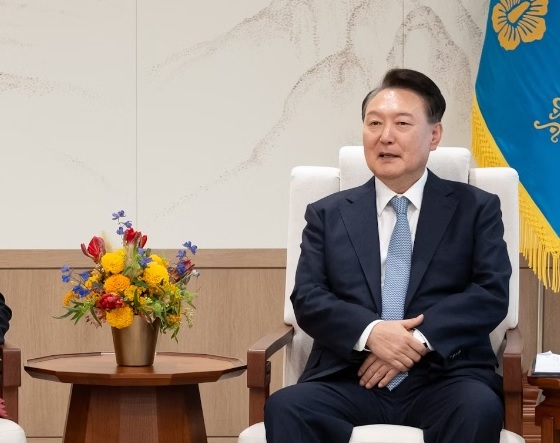
(Photo : X.com)
South Korean President Yoon Suk Yeol
- South Korea's President Yoon Suk Yeol faces impeachment over his attempt to impose martial law.
- The move has sparked domestic outrage and international concern, with the impeachment motion set to be voted on this weekend.
- The crisis has alarmed international observers, with the US and Japan expressing concern over the instability.
- If the impeachment bill passes, South Korea's Constitutional Court will decide whether to uphold the motion, potentially leading to a new election.
South Korea's President Yoon Suk Yeol is currently embroiled in a political crisis following his controversial attempt to impose martial law. This move, seen as an effort to consolidate power, ban political activity, and censor the media, has sparked outrage domestically and concern among international allies. The impeachment motion was introduced by opposition lawmakers who plan to vote on it this weekend.
The Democratic Party, which is leading the charge, needs at least eight of the 108 ruling-party lawmakers to back the bill for it to pass with a two-thirds majority in the 300-seat parliament.
The martial law declaration has been described as causing great confusion and fear among our people, by Democratic Party lawmaker Kim Seung-won. However, Yoon's ruling People Power Party, despite being divided over the crisis, has stated it would oppose impeachment, with two years left in Yoon's five-year term.
In the midst of this political turmoil, Yoon accepted the resignation of Defence Minister Kim Yong-hyun, who had recommended the martial law declaration. Kim also ordered the deployment of troops to the parliament, a move he later apologized for and took responsibility for failing to prevent.
International Reactions and Implications
The martial law declaration and the subsequent political fallout have alarmed international observers. Japanese Prime Minister Shigeru Ishiba expressed concern that the instability in Seoul and North Korea's rising military assertiveness could fundamentally change Japan's security situation.
The United States, which has 28,500 troops stationed in South Korea, was not made aware in advance of Yoon's declaration. Secretary of State Antony Blinken stated that Yoon had badly misjudged the situation. The commander of U.S. Forces-Korea, General Paul LaCamera, has warned American troops to stay vigilant and avoid areas with protests.
Impeachment and Its Aftermath
The impeachment plan follows a night of chaos after Yoon declared martial law and armed troops attempted to force their way into the National Assembly building in Seoul. The troops were pushed back by parliamentary aides using fire extinguishers. This event has led many protesters to fear a return to the dictatorships and martial law that marked much of South Korea's post-war period.
The crisis has also rattled global financial markets and South Korea's benchmark KOSPI index. If the impeachment bill passes, South Korea's Constitutional Court will then decide whether to uphold the motion - a process that could take up to 180 days. If Yoon were to be suspended from exercising power, Prime Minister Han Duck-soo would fill in as leader. If Yoon resigned or was removed from office, a new election would be held within 60 days.
This political crisis is reminiscent of the impeachment of South Korea's first female president, Park Geun-hye, in 2016. Park was impeached following a corruption scandal that led to massive protests. The impeachment was upheld by the Constitutional Court, leading to a new election. The current situation, however, is unique in its own right, given the attempted imposition of martial law, a move not seen in South Korea since the 1980s.









